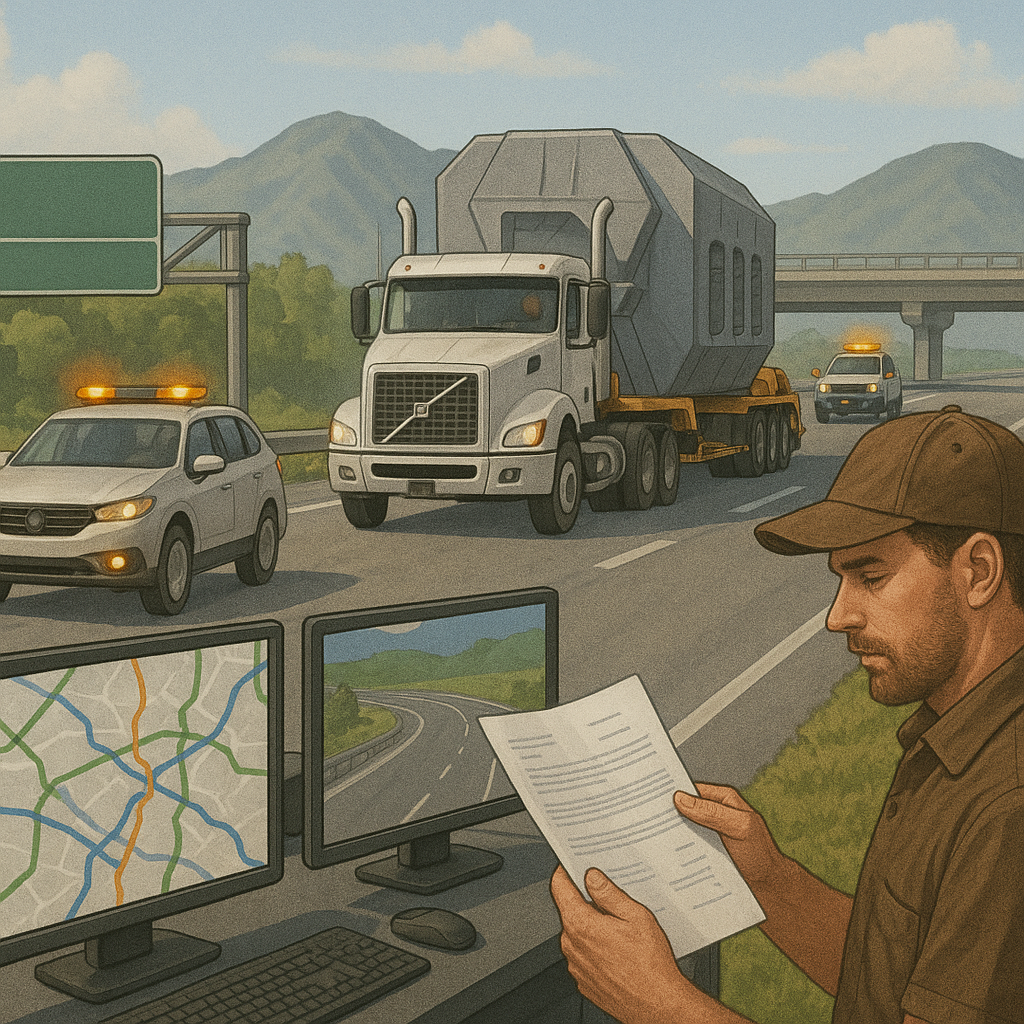If you’re in the business of moving oversized loads, then you’re already familiar with how detailed, regulated, and downright complicated pilot car requirements can be. From state-specific rules to operator certifications, escort vehicle compliance isn’t just a box to check — it’s an operational mandate. At Reliable Permit Solutions, we live and breathe these regulations so you don’t have to. Let’s break down everything you need to know about pilot car requirements, all in one cohesive, no-fluff guide built for logistics professionals, fleet managers, and carriers alike.
Why Pilot Car Requirements Exist (And Why You Should Care)
Pilot cars — or escort vehicles — are more than just flashing lights and oversized load signs. They are legally mandated safety mechanisms designed to help ensure the secure and smooth transit of oversize and overweight loads. These requirements aren’t just about visibility; they address safe routing, traffic control, communication, and liability. Not meeting pilot car requirements can result in major delays, fines, and increased accident risk.
Training & Certification: Not Just Anyone Can Escort
Before you hand over the keys to a pilot car, know this: most states require escort drivers to undergo specific training and certification. These aren’t voluntary programs — they’re legally enforced. Pilot car operators in states like Florida, Virginia, and Washington must complete approved certification courses that cover defensive driving, load dynamics, and escort protocol. Some jurisdictions also require a defensive driving record or annual re-certification. Reliable Permit Solutions helps clients navigate which pilot car requirements certification applies in each jurisdiction so you’re never caught off guard.
Vehicle Standards & Equipment Specs
Let’s talk gear. Proper equipment isn’t a nice-to-have — it’s the core of pilot car requirements vehicle standards. Depending on the state, a compliant escort vehicle must be equipped with:
- Rotating or strobe amber lights (visible 360 degrees)
- Oversize load signs (front and/or rear, depending on placement)
- Two-way radios or CB radios for real-time communication with the transport driver
- High-visibility flags or paddles
These vehicle specs can vary by state, so Reliable Permit Solutions keeps an updated matrix of all pilot car requirements equipment standards — saving you hours of research and risk.
State-by-State Variations: No Two Jurisdictions Are the Same
One of the most frustrating parts of managing escort operations is that pilot car requirements by jurisdiction differ wildly. For instance:
- In California, one pilot car may suffice for a load over 12 feet wide.
- In North Carolina, the same load might require two escort vehicles and a law enforcement escort.
- In Texas, vertical clearance over 17 feet triggers additional pilot car needs.
Reliable Permit Solutions decodes this complexity by offering route consultations that include state-specific pilot car requirements so you’re covered from origin to destination.
When Do You Actually Need a Pilot Car?
This is the golden question. Generally, pilot car requirements thresholds are triggered when loads exceed certain width, height, or length dimensions. As a baseline:
- Width: Over 12 feet usually requires at least one escort
- Height: Over 14.5 feet can trigger high-pole pilot requirements
- Length: Loads over 85-100 feet may need rear or front escorts depending on configuration
But again — these figures fluctuate depending on the state, route, time of day, and even weather. Reliable Permit Solutions provides dimension-based compliance analysis to ensure you meet all pilot car requirements standards before you roll.
Coordinating Multiple Escorts for Complex Loads
When a load is pushing extremes on multiple dimensions, expect multiple escort vehicles. This isn’t just about numbers — it’s about coordination. Front and rear cars must maintain communication protocols, manage detours, and sometimes interact with law enforcement. Reliable Permit Solutions offers scalable logistics support for pilot car requirements complex loads, streamlining communication and ensuring operational synchronicity.
Documentation and Compliance: Don’t Get Caught Without It
Each escort vehicle needs to carry specific permits and proof of certification — often including route maps, DOT numbers, insurance documents, and vehicle inspection reports. Reliable Permit Solutions ensures all pilot car requirements documentation is accounted for and accessible.
Non-Compliance Is Expensive
Falling short of pilot car requirements can result in hefty fines, denied entry at state lines, revoked permits, or even impoundment. And those aren’t theoretical risks — they happen all the time to carriers who underestimate how serious the rules are.
Reliable Permit Solutions keeps your operation airtight, with proactive compliance tracking and a team that’s fluent in regulation-speak so you can avoid costly surprises.
Leave It to the Pros: Why Use Reliable Permit Solutions?
In an industry where one small mistake can cost thousands of dollars, partnering with professionals makes sense. Reliable Permit Solutions offers full-service support for pilot car requirements — from training and equipment consultation to permit procurement and real-time compliance alerts. Our team is dedicated to helping your oversize operations run smoothly, efficiently, and without regulatory hiccups.
Final Word
Navigating pilot car requirements across states doesn’t have to feel like decoding a legal textbook. With the right partner — like Reliable Permit Solutions — you gain clarity, compliance, and confidence. Whether you’re escorting a 14-foot-wide excavator or a 120-foot wind turbine blade, we’re here to help you meet the requirements and keep things moving.
Let Reliable Permit Solutions be your guide — because in the world of oversized transport, the road to success is built on compliance.

